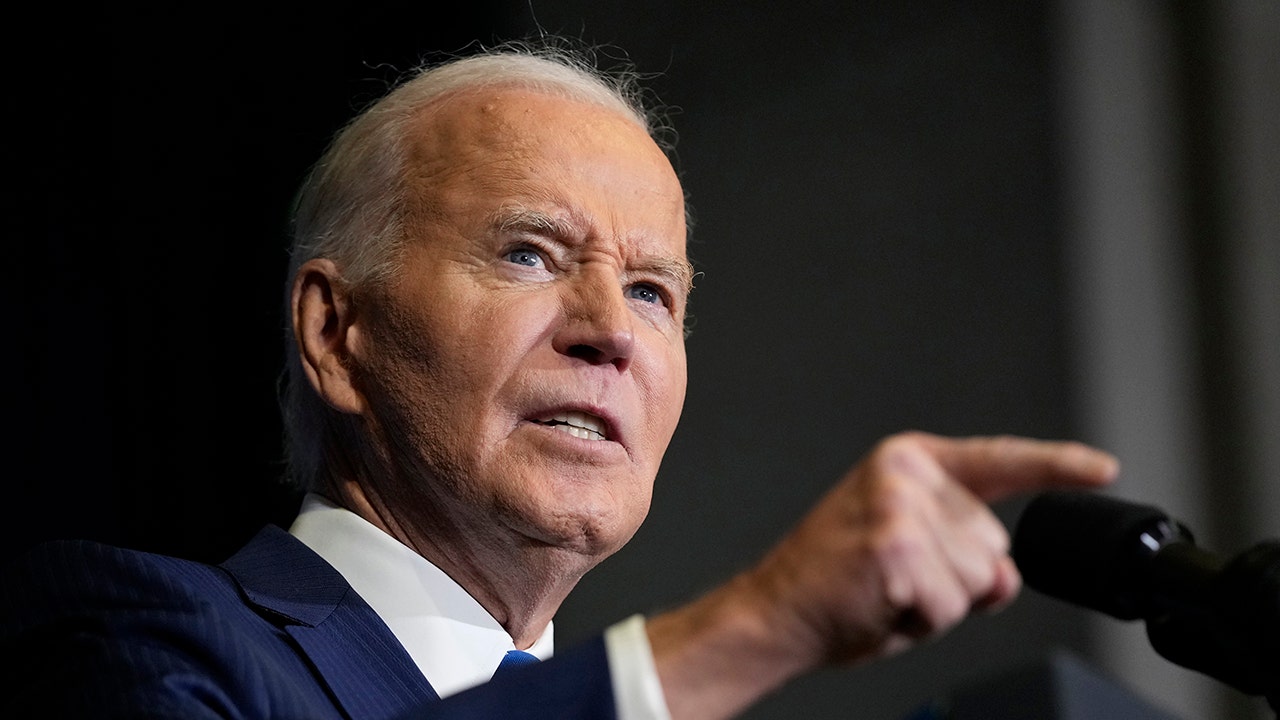Washington – While the actions of the administration of the US President joe biden Considered unprecedented in the way Washington supports Israel’s attacks on Palestinian civilians, to the point of rejecting the call for a ceasefire, American history reveals that Biden’s approach is not radically different from long-term American policy towards Palestine and Israel.
The Biden administration showed extremism in its provision of American military, diplomatic, emotional and political support, following the start of the battle.Al-Aqsa flood“On October 7, when Biden visited Israel and participated in the work of the War Cabinet, he reiterated support for his administration and that his country stands as a full partner alongside Israel in its war against the Islamic Resistance Movement (agitation).
Khaled El-Gendy’s book “The Blind Spot: America and the Palestinians from Balfour to Trump,” when placed in the context of the Al-Aqsa flood events and their aftermath, reveals that Biden’s approach is “the culmination of the traditional American approach in dealing with Israel and the Palestinians, an approach characterized by its remarkable consistency across Republican and Democratic administrations.” “.
The title of the book (published in 2019 by the Brookings Institution Publishing House) refers to the blindness of American governments to being mediators in the Palestinian-Israeli conflict in several aspects:
Firstly- Washington was blind to the vast power disparity between the two parties, and constantly exerted disproportionate pressure on the weaker party (the Palestinians), with little corresponding pressure on the much stronger party (Israel).
secondly- The United States has been blind to the internal “dynamics” of Palestinian politics and, at the same time, has often built its own policies around Israeli politics, constantly backing down to Israeli leaders.
Third- The United States was blind to the fact that transforming Palestinian leaders into what it and Israel considered “adequate peace partners” had eroded their political legitimacy and fragmented Palestinian politics, which had historically led to the emergence of resistance groups against Israel, led by Hamas.
Historical American blindness
Khaled Elgindy, a former advisor to the Palestinian leadership in negotiations with Israel and director of the Program on Palestine and Palestinian-Israeli Affairs at the Middle East Institute in Washington, offers a balanced and comprehensive interpretation of more than a century of American policy on Palestinian issues.
The book explains that Washington’s neglect came as a result of the pressures of American domestic politics and the special relationship with Israel, which has deep historical roots dating back to Balfour Declaration In 1917 and the British Mandate, although the size of the “blind spot” varies over the years and from one administration to another, it always remains present.
The first section of the book covers the administrations of Truman, Eisenhower, and Kennedy, all of which refused to deal with the issue of Palestinian self-determination, as American presidents increasingly acquiesced to Israel’s refusal to return any Palestinian refugees from 1948, which allowed President Lyndon Johnson – the first president to maintain a “personal closeness with… “Jewish State” – by denying the existence of the Palestinian refugee problem, while expanding arms sales to Israel, and preventing measures that Israel opposes in United nations.
However, most of the book details the history of American policy after 1967, a period that saw the slow emergence, then steady decline, of what we now know as the “peace process.”
Khaled Elgindy recounts the plan to “keep the Palestinians out of the diplomatic process” during the Nixon, Ford, and Reagan administrations, an effort he led. Henry KissingerBy refusing to deal with Palestine’s libiration organisation For as long as he could remember, Carter proved to be the exception to this rule, but as the book makes clear, his hands were largely tied by the actions of his predecessors.
As a result of Kissinger’s thesis that “a weak PLO would be a boon for peace and stability,” the organization saw a decline in its legitimacy among Palestinians and lost the ability to control various Palestinian factions, paving the way for a rise in attacks against Israel and the emergence of Hamas in the late 1980s. .
The development of American blindness
Since the start of the Oslo negotiations in 1993, successive US administrations have tended to ignore or underestimate the huge disparity in power between the two sides, and Washington has ignored that the relationship between Israelis and Palestinians is not only a relationship of conflict, but rather a relationship of occupation in which Israel directly controls the lives of millions of Palestinians.
Given the unusually close ties between the United States and Israel, and the undue influence of the pro-Israel lobby, it has been easier and less politically costly for US officials to focus on aspects; Such as: repair Palestinian Authority improving Israeli security, rather than pressuring Israeli leaders on issues; Such as: Israeli settlements, or respect for Palestinian rights.
Despite the symbolic importance of the Oslo Accords, Khalid wrote, the blind spots that pervaded the policymaking process in the Clinton, Bush, and Obama administrations alike ensured that the peace process would achieve exactly the opposite of its intended goals: emboldening extremists and militants on both sides, increasing violence, and expanding the occupation. Israeli.
The three presidents reinforced the power imbalance by focusing exclusively on reforming Palestinian political institutions, without addressing the massive increase in the number of Israeli settlers during the Oslo years. They merely denounced settlement building and claimed to support UN Resolution 242, while they were “punching holes in it.” “By inventing loopholes to allow the ‘natural growth’ of settlements.
The three increased pressure on the Palestinian leadership to comply with American and Israeli demands, while at the same time reducing the value of this compliance, which helped further erode the legitimacy of the Palestinian Authority and exclude some Palestinian factions from the negotiations.
The writer says that the Israeli leaders were able to maintain the occupation indefinitely, and did not feel any pressure to negotiate to change the status quo in times of peace, and during periods of escalating violence, the Israeli leaders “completely lacked the will” to enter into negotiations, and providing Israel, with almost limitless economic, military and political incentives, did not make its leaders more willing to make concessions, but rather this allowed them to “bear… the costs of the occupation.”
On the other hand, Palestinian leaders faced the opposite problem: For more than four decades, they sought to achieve lasting peace with Israel on the basis of mutual settlement, but “they lacked the ability, politically and materially, to achieve this.”
Results of American blindness
The United States has invested a lot of time, money, and effort in pursuing Israeli-Palestinian peace and a two-state solution, yet American attempts to mediate an end to the conflict have repeatedly failed.
At the heart of these failures lie two crucial factors: Israeli power and Palestinian politics. Ultimately, American peacemaking efforts faltered, as a result of Washington’s unwillingness to confront the already deepening Israeli occupation.
Perhaps it was the administration of the former president Donald Trump Most cruel to the Palestinians; By stopping funding the United Nations Relief and Works Agency for Palestine Refugees (UNRWA), dispensing with the term “occupation,” ending Palestinian diplomatic representation in Washington, and the subsequent transfer of the American embassy from Tel Aviv to Jerusalem, and recognizing it as the unified and eternal capital of Israel. However, the actions of the Democratic president who preceded him paved the way for this; He was rewarded Barack Obama Israel received the largest US military aid package in its history, after signing the nuclear agreement with Iran in 2015. However, what Biden did in supporting the Israeli aggression against civilians…Gaza stripThis exceeds any previous support Israel has received throughout its history.






